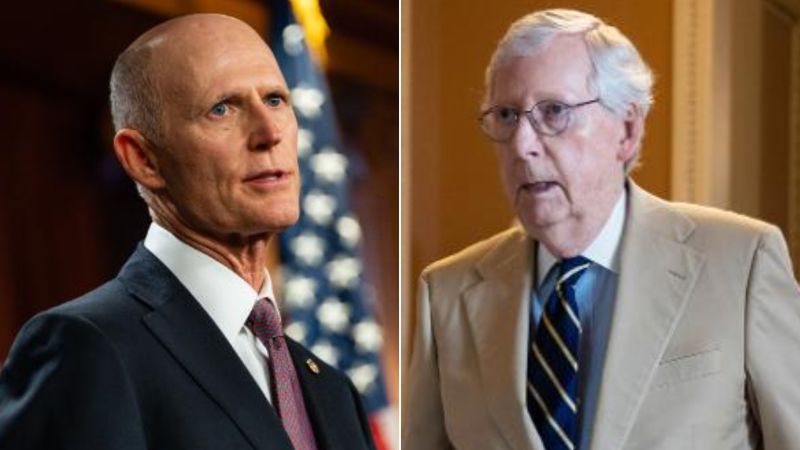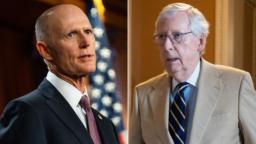

CNN
—
GOP senators are privately alarmed at the cash problems facing Sen. Rick Scott’s National Republican Senatorial Committee, uneasy over his feud with Senate GOP Leader Mitch McConnell and worried that their internal issues could undercut their already difficult road back to the majority this fall.
Behind the scenes, GOP senators are maneuvering to make up for the committee’s cash shortfall, with discussions underway to take matters into their own hands to circumvent the NRSC entirely and directly help candidates who need critical resources down the homestretch of the high-stakes campaign, according to multiple GOP sources.
A new fear among Republicans: The NRSC won’t be able to bankroll its part to target voters with direct mail and urge them to come to the polls in key battleground states, something that the party committee spent tens of millions of dollars to do during the 2020 cycle.
McConnell, meanwhile, has been on the phone with big donors for the past several weeks – going well beyond his traditional call list – in an effort to ensure his high-spending super PAC, the Senate Leadership Fund, is flush with cash to spend huge sums on TV ads in battleground states in the campaign’s final two months, one senior GOP source said.
In an August meeting with GOP senators, McConnell urged members to transfer money from their leadership PACs to the Senate Leadership Fund even after a presentation showing that Senate GOP leaders had given far less to the NRSC than top House Republicans have given to their campaign arm, a source familiar with the matter said. Just two GOP senators ponied up to the NRSC after that presentation.
“Well, it concerns me a lot,” Texas Sen. John Cornyn, a member of McConnell’s leadership team and former NRSC chairman, when asked about the money the committee is burning through. “The Democrats are going to vastly outspend Republicans across the board. But as long as we have enough money to tell our story and to defend our opposition, I think we’ll be fine.”
Other prominent Republicans have also been taking matters into their own hands. Senate GOP Whip John Thune of South Dakota has been in talks with candidates over setting up joint fundraising committees to help them directly, according to a source familiar with the matter, and has raised concerns with the NRSC’s cash problems.
In the past week, The New York Times published a detailed report on the committee’s dire financial shape after betting big on digital fundraising, and Scott wrote an explosive op-ed implicitly criticizing McConnell for publicly questioning the “quality” of their own candidates (Scott denied on Tuesday he was taking aim at McConnell).
“I think we need to be united in our message,” Sen. Shelley Moore Capito, a Republican from West Virginia, said Tuesday. “We have a great opportunity here and so I don’t think it’s a good strategy to be feuding two months before the election.”
The NRSC raised $181.5 million through the end of July but had on hand only $23.2 million. The Democratic Senatorial Campaign Committee raised less – $173.1 million – but had on hand $54.1 million, more than twice the NRSC’s amount. SLF, which can raise unlimited sums from individuals and groups, had on hand over $104 million at the end of June, according to the latest FEC report.
“They were handed a rare custom built, one-of-a kind Ferrari that took 10 years to build – and they drop the hammer and drove it right into a brick wall,” one long-time GOP strategist said.
NRSC spokesman Chris Hartline said the disparity in cash stems from the organization’s decision to strategically spend tens of millions of dollars on ads early in the contests to boost Republicans. He said that Scott “has been clear” with everyone since the beginning of the 2022 cycle – “and it’s working.”
“We’re in a better position in every one of our target states than we were at the beginning of the summer, largely because the NRSC has been spending early and heavily to support our candidates and define the Democrats,” Hartline said. “We invested in tripling our house file, an investment that is paying off now and will continue to pay off for cycles to come.”
“He told everyone what he was going to do, he did it, and it’s working,” added Hartline. “If anyone is surprised, they haven’t been paying attention.”
Scott’s joint fundraising committee has given over $8 million to the NRSC, according to the latest FEC reports. McConnell Victory Committee and Team McConnell have given nearly $700,000 to the NRSC.
But there are growing concerns over campaigns’ efforts to turn out voters on Election Day – in no small part due to the committee’s cash shortfalls.
During the 2020 election cycle, when the committee was run by Indiana Sen. Todd Young, NRSC Targeted State Victory, a joint fundraising committee, raised over $18 million and sent hundreds of thousands of dollars to a number of state party committees to help voters get to the polls. It raised another $1 million between January and March 2021 before the NRSC shut it down. Since then, the NRSC created another joint fundraising committee, Take Back the Senate, which raised just $1.2 million from April 2021 through June 2022.
“The real problem I hear from campaigns is a hole in the budget for turnout mail,” said the first GOP strategist.
Scott made the decision early in the cycle to abandon the tactics of his predecessors and maintain a hands-off posture during the primaries. That approach, Republicans privately complained, ended up hurting some candidates – particularly in Ohio and Arizona – as they pivoted to the general election from the primary. Since some lacked candidate training, access to critical research and experienced staff and fundraisers that the NRSC has given candidates in previous cycles, it provided well-funded Democratic candidates a chance to bombard the airwaves while their GOP opponents were still finding their general election footing. The NRSC has said that it has worked closely with various candidates and will do what is necessary to win in November.
In past election cycles, McConnell was heavily involved in the NRSC. But as his disagreements with Scott’s approach intensified, he has instead focused his efforts squarely on his super PAC.
“McConnell decided rather than fight this to focus all his efforts on SLF,” a source familiar with the matter said.
The issue came back to the fore last month, when McConnell acknowledged that “candidate quality” could hurt the party’s ability to take back the chamber. The comments were in line with comments the GOP leader had been making for years about Senate races, but it was interpreted as a dig at some of the lackluster performances of the GOP field so far.
Last week, Scott fired back. He told Politico that he and McConnell “clearly have a strategic disagreement” over the party’s candidates. The Florida Republican also wrote an op-ed in the Washington Examiner, lashing unnamed Republicans for acting “treasonous to the conservative cause.”
“Unfortunately, many of the very people responsible for losing the Senate last cycle are now trying to stop us from winning the majority this time by trash-talking our Republican candidates,” Scott wrote.
While Scott did not mention McConnell by name, his op-ed was widely viewed as a broadside launched against the GOP leader and his allies.
Asked if Scott’s op-ed was helpful, Thune said: “Well,” and walked into McConnell’s office.
McConnell, as he left the Senate floor, walked in silence when asked by reporters about Scott.
Scott claimed on Tuesday that the piece was not directed at McConnell.
“I didn’t say anything about somebody else,” said Scott, as he was leaving McConnell’s office after a leadership meeting. “It said people who are doing anonymous quotes and trashing our candidates, yeah, it’s treasonous to the conservative cause.”
Privately, though the assessment is different.
“McConnell’s comments hurt Republican candidates,” a source close to Scott said. “Anyone who disagrees with that is either an idiot or on McConnell’s payroll.”
A senior GOP strategist fired back.
“If you don’t know the difference between how House and Senate campaigns are financed, you probably shouldn’t advertise that in September of an election year if you’re in charge of Senate elections,” the strategist said.
Scott, who may run for President in 2024, is expected to appear with a House candidate in Iowa this month, as well as Iowa Sen. Chuck Grassley.
The back-and-forth has made GOP senators uncomfortable.
“It’s clear to me that Republicans need to rally around their candidates if we are ever going to have success, and we can’t afford to have divisions within our conference,” said Kansas Sen. Jerry Moran, a former NRSC chairman who is up for reelection this year.
“It’s always best to stand behind Mitch McConnell,” said Sen. Mitt Romney, a Utah Republican.
Sen. Thom Tillis, a Republican of North Carolina, said the spat over the NRSC is “a distraction from what voters are going to be motivated by,” maintaining he does have confidence in Scott to run the NRSC, while acknowledging it’s a mistake for Republicans to be infighting instead of battling Democrats.
“I don’t think it ever makes sense – I’ve been doing this since 2007 – and it always makes sense to focus on who you want to defeat in November, not each other,” he said.
Scott and McConnell, the longest-serving Senate Republican leader, have also sparred over Scott’s decision to release a plan to “rescue America” that at least briefly shifted the attention from Republicans’ perceived failures of the Biden administration. The White House sharply criticized Scott’s provisions to have every American pay at least some income tax and to sunset all federal laws in five years. Democrats still are bashing the plan on the campaign trail, something McConnell feared as he sought to shy away from offering an election-year agenda that Democrats could attack.
“Let me tell you what would not be a part of our agenda,” said McConnell at a news conference after Scott unveiled his plan. “We will not have as part of our agenda a bill that raises taxes on half the American people, and sunsets Social Security and Medicare within five years.”
In June, Scott dropped the controversial provisions in a revised proposal.
On Tuesday, the feud did not come up during a leadership meeting in McConnell’s office, according to Cornyn.
And when asked directly if he had complete confidence in Scott, Cornyn instead said: “I have complete confidence that he wants to do what we all want to do, which is win the majority back and it’s certainly – it’s very competitive.”
This story has been updated with additional information Tuesday.
